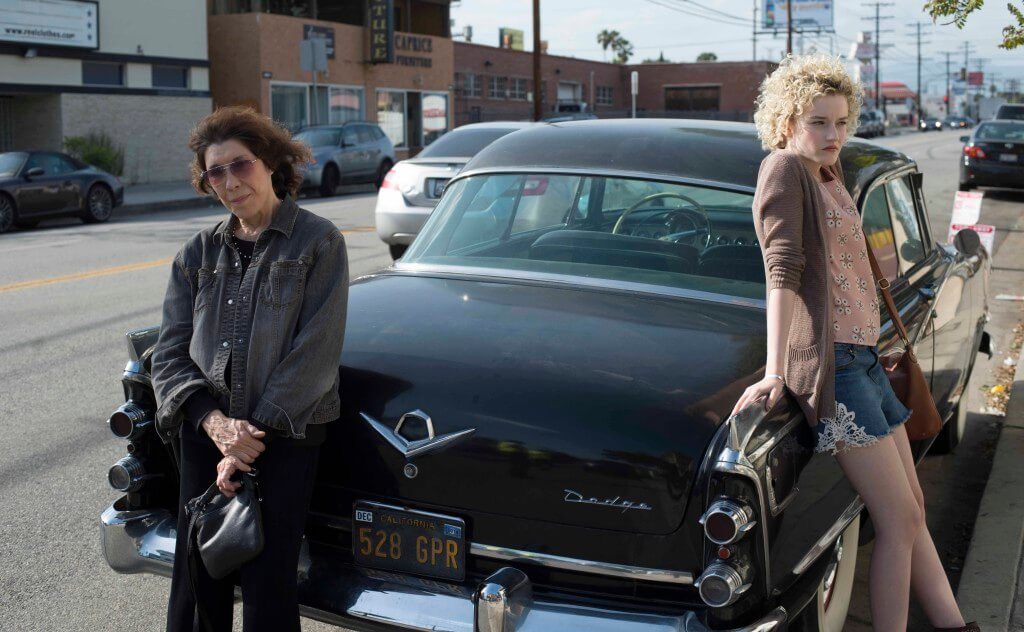Grandma
[dropcap]O[/dropcap]ne of the most fulfilling cinematic experiences is when your struggles are named, explored and made visible. Grandma is a film which did this for me. Feminism is a continuing prevalent issue, especially for young women all around the world, asking – do we stick to the core values of the movement? Should we decide for all-inclusiveness? What points should be underlined while others are pushed into history for being outdated?
With the recent premieres of Suffragette, Carol and The Danish Girl, the topics of identity, feminine power and fighting against the patriarchal system are being explored once more in Hollywood. After hearing Paul Weitz’s name, I wasn’t feeling too optimistic about the film; advertised as a mismatched Thelma & Louise type of a road trip comedy. A director known for films such as Antz and About a Boy, the film won me over by the actors in front of the camera rather than those behind it.
…Grandma is similar to a course in feminist theory, with clear shootouts to theoretical classics such as The Feminine Mystique and The Second Sex
Set in Los Angeles, the film follows a small portion of the life of an old-school, die-hard feminist from the 1970s, Elle (Lily Tomlin). She is a poet, an academic, who is cool, suave, and tired of pretending to like people. She is also a lesbian, an element which is heavily emphasised in the screenplay but fits as natural to the character as breathing. The plot centres on Elle helping out her granddaughter, Sage (Julia Garner), who wants to get an abortion.
The characters are more archetypes than normal people. Sage is the stereotypical third wave feminist figure; middle-class and too comfortable to act on her wants. Tired of any political involvement, it is hard to pinpoint her exact age, save for her immature behaviour and choices. Her mother, a character feared for the majority of the film, is a typical businesswoman who’s too busy to properly care for her daughter. She symbolizes the career-driven, successful woman whereas Elle acts as the revolutionary, fighting figure who believed in change, fighting for abortion clinics and marching in the street to show her solidarity with other women.
The film is filled with numerous LGBT themes, featuring: lesbian couples, non-traditional families and transsexual rights. Men are portrayed either as incompetent, idiotic or completely absurd, as we follow Elle and Sage’s journey in her stylish car through the highways surrounding L.A. Action is packed into every second, with witty dialogue and sharp references narrating the critique of today’s feminism and its divergence from its initial roots.
It is also an acting master class, with Lily Tomlin’s performance taking the front row each time she appears on screen. Shot with beautifully tinted filters, the film is a truly art-house lucid dream. Elle’s 1955 Dodge Royal takes us on a journey flavoured by nostalgia, fleeting of love and youth, as Tomlin’s wrinkles contrast sharply with the sweetness of Garner’s fresh face, and the experienced clashes with naivety; independence with conformity.
Furthermore, Grandma is similar to a course in feminist theory, with clear shootouts to theoretical classics such as The Feminine Mystique and The Second Sex, whose covers appear briefly on-screen or are referenced in dialogue. It is also a study in how much has been won already for women’s cause and how much could be still done if today’s teenagers could be persuaded to take action in the same way as before.
I’ve been catching up on the most important feminist books of 20th century over the past year and this film seems like a wonderful gift to me; something which every young woman should watch for the reassurance that through a struggle, one’s personality is developed. You have to have something to stand up for, otherwise, what’s the point of life?
Director: Paul Weitz
Starring: Lily Tomlin, Julia Garner, Marcia Gay Harden, Judy Greer, Laverne Cox, Sam Elliott, Nat Wolff, John Cho
Running Time: 79 Mins
Country: USA



Comments (1)
Magnificent site. A lot of useful information here. I’m sending it to a few friends ans also sharing in delicious.
And certainly, thanks to your sweat!